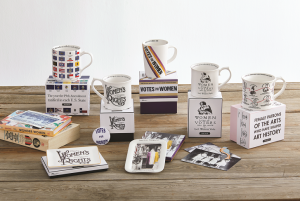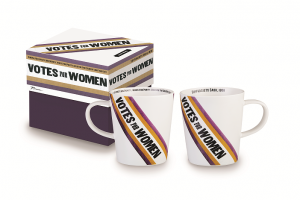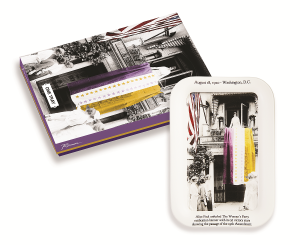Votes for Women Collection Celebrates a Century of Struggle
By Lorrie Baumann
 Rosanna is celebrating the 100th anniversary of women’s right to vote in the U.S. with the creation of its Votes for Women collection, the fourth in a series of collections acknowledging women’s progress. Owner Rosanna Bowles created the collection to remind women that it’s only in the last 100 years that American women have been regarded as equal citizens in this country. “People don’t understand how far women have come,” she said. “Millennials and Generation Z may not know that in 1970, a woman couldn’t get a credit card without her husband’s signature.”
Rosanna is celebrating the 100th anniversary of women’s right to vote in the U.S. with the creation of its Votes for Women collection, the fourth in a series of collections acknowledging women’s progress. Owner Rosanna Bowles created the collection to remind women that it’s only in the last 100 years that American women have been regarded as equal citizens in this country. “People don’t understand how far women have come,” she said. “Millennials and Generation Z may not know that in 1970, a woman couldn’t get a credit card without her husband’s signature.”
American women gained the right to vote in national elections through the 19th Amendment to the U.S. Constitution, which was ratified on August 18, 1920 after almost a century of political activism around the issue. The movement for women’s rights launched on a national level with the Seneca Falls Convention organized by Elizabeth Cady Stanton and Lucretia Mott in 1848 and continues today.
Following the 1848 convention, Stanton and Mott, along with Susan B. Anthony and other activists, raised public awareness and lobbied the government to grant voting rights to women. By 1878, the collective suffrage movement had gathered enough influence to lobby the U.S. Congress for a constitutional amendment granting women the right to vote, but when the proposal finally reached the Senate floor in 1886, it was defeated. Suffragists turned to lobbying individual states, and by 1918, 20 states, mostly in the western U.S., and the Alaska territory had enfranchised women.
 The election of Woodrow Wilson and the United States’ entry into World War I brought the issue back to Washington, D.C. and on May 21, 1919, the U. S. House of Representatives approved the Susan Anthony Amendment granting women the right to vote in a 304-89 vote, 42 votes above the required two-thirds majority. On June 4, 1919, the U.S. Senate passed the 19th Amendment by two votes over its two-thirds required majority, 56-25, and the amendment was sent to the states for ratification. The Amendment reads, in its entirety, “The right of citizens of the United States to vote shall not be denied or abridged by the United States or by any state on account of sex. Congress shall have power to enforce this article by appropriate legislation.”
The election of Woodrow Wilson and the United States’ entry into World War I brought the issue back to Washington, D.C. and on May 21, 1919, the U. S. House of Representatives approved the Susan Anthony Amendment granting women the right to vote in a 304-89 vote, 42 votes above the required two-thirds majority. On June 4, 1919, the U.S. Senate passed the 19th Amendment by two votes over its two-thirds required majority, 56-25, and the amendment was sent to the states for ratification. The Amendment reads, in its entirety, “The right of citizens of the United States to vote shall not be denied or abridged by the United States or by any state on account of sex. Congress shall have power to enforce this article by appropriate legislation.”
By March of the following year, a total of 35 states had approved the amendment. Tennessee became the state that supplied the three-fourths majority required to ratify the amendment on a 49-48 vote, with the deciding vote cast by Harry T. Burn, a Republican Representative from McMinn County. On August 26, 1920, the 19th Amendment was certified by U.S. Secretary of State Bainbridge Colby. Mississippi became the last state to ratify the 19th Amendment in 1984.
Through her Votes for Women collection memorializing the ratification of the 19th Amendment, Bowles intended to honor and raise awareness around that history rather than to make a political statement. “I’m a mother of two daughters,” she said. “I wanted to do a product that would make women feel empowered. The mugs make a statement to celebrate how much women have accomplished…. We’re retelling history, and, hopefully, it will help young women understand how far we’ve come.”
 While some of the mugs feature simple slogans commemorating the anniversary, others feature graphic imagery authentic to the era of the women’s suffrage fight, gathered from authentic ephemera of the period in Bowles’ collection. “Women bring all Voters into the World. Let women vote” was a sign that women put in their homes, for instance. The “Votes for Women” mug is adorned in the colors of the sash worn by suffragists when they marched in parades.
While some of the mugs feature simple slogans commemorating the anniversary, others feature graphic imagery authentic to the era of the women’s suffrage fight, gathered from authentic ephemera of the period in Bowles’ collection. “Women bring all Voters into the World. Let women vote” was a sign that women put in their homes, for instance. The “Votes for Women” mug is adorned in the colors of the sash worn by suffragists when they marched in parades.
Rosanna’s Votes for Women collection joins previous collections in the series: Phenomenal Women; You Go Girl; and Ladies Choice. Items in the collections, which are all currently offered, are available as mugs, totes, travel mugs and trays. All of them appeal to women who shop with their values as well as their dollars. “People don’t want to buy stuff – they want to buy something that means something,” Bowles said. “When one of these mugs sits on your desk, it makes a statement about who you are. These collections tell stories about the women who make them and the women who buy and use them.”
For more information about the Votes for Women collection as well as other items in the Rosanna tableware and home décor collections, visit www.rosannainc.com.

You must be logged in to post a comment.